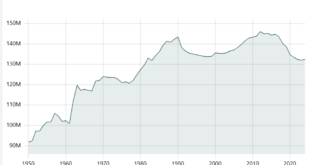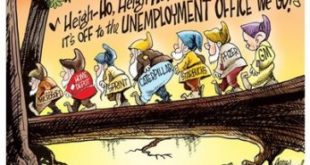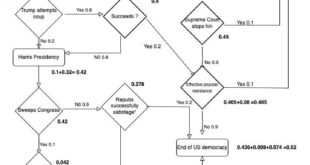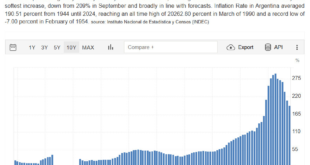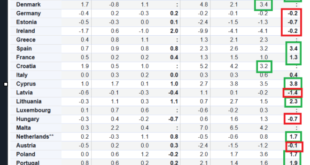The ´natural rate of unemployment´, also called ´Non-Accelerating Inflation Rate of Unemployment´ (NAIRU) or ´Non-Accelerating Wage Rate of Unemployment´ (NAWRU), is as, on this blog, Lars Syll states (here and here), a dangerous tool. According to NAIRU/NAWRU theory, a) When unemployment falls below a certain threshold, an inexorable increase in inflation will start. This is simply not true, considering the facts. b) As NAIRU/NAWRU theory is untrue, it can´t be measured by...
Read More »Busting the ‘natural rate of unemployment’ myth
from Lars Syll Sixty years ago Milton Friedman wrote an (in)famous article arguing that (1) the natural rate of unemployment was independent of monetary policy and that (2) trying to keep the unemployment rate below the natural rate would only give rise to higher and higher inflation. The hypothesis has always been controversial, and much theoretical and empirical work has questioned the real-world relevance of the idea that unemployment really is independent of monetary policy and that...
Read More »The political economy of estimating productivity.
Who decides what statistical offices measure and how they measure it? And what are the implicit values embedded in these decisions? Recently, the ILO issued a new manual on measuring productivity. Below, I´ll discuss the questions posed. But for starters, it is essential to realize that economists measure monetary productivity, not physical productivity, which leads to problems with ever-changing prices. This will be part of the discussion. The ILO (International Labour Organization)...
Read More »Peak babies has been. Young men are not expendable, anymore.
Peak Babies was in 2012. At this moment, we´re back to the level of forty years ago (and the most recent data may well be an overestimate). For the first time in centuries, cohorts entering the global labour market will soon be smaller than the cohorts preceding them. Even when there are significant differences in levels between countries, the years around 1970 were a turning point everywhere. In 1965, the relentless movement towards below-replacement human reproduction started....
Read More »NAIRU — a harmful fairy tale
from Lars Syll The NAIRU story has always had a very clear policy implication — attempts to promote full employment are doomed to fail since governments and central banks can’t push unemployment below the critical NAIRU threshold without causing harmful runaway inflation. Although a lot of mainstream economists and politicians have a touching faith in the NAIRU fairy tale, it doesn’t hold water when scrutinized. One of the main problems with NAIRU is that it is essentially a timeless...
Read More »Monetary developments in the Euro Area, september 2024. Quiet.
Like John Stuart Mill, I´m more interested in credit than in money. Developments in the amount of credit provided are much more instructive to the economist than data on money. Look at the graph below (no. 2 in the ECB press release) , a highly Post-Keynesian graph that originated from the pre-Euro Bundesbank and is now published by the European Central Bank. It shows that money growth in the EU is relatively moderate and, more interesting, caused by a combination of 1) lather large...
Read More »Trump’s dictatorship is a fait accompli
What can Americans do? What should Australia do? A few weeks ago, I drew up a flowchart to estimate the probability that Trump would establish a dictatorship in the US, which looked, at the time, like an even money bet. We don’t need to speculate any more. Trump has announced the dictatorship, and there is no sign of effective resistance. The key elements so far include Extremists announced for all major positions, with a demand that they be recess appointments, not subject to...
Read More »Superinflation in Milei´s Argentina
Hyperinflation is defined as over 50% inflation per month. Let´s define ´normal´ inflation as anything between 0 and 1% per month and anything between 1 and 50% per month as superinflation (1% a month is still a lot, yearly!). Before President Milei, Argentina already knew superinflation. After Milei, inflation accelerated, and the country almost entered a period of hyperinflation. It´s still nearly 200% a year. The maximum monthly increase of the consumer price index was over 24%. These...
Read More »Election: Take Four
from Peter Radford Take four. I continue to listen in on the conversation. The election reverberates loudly around leftish circles. Recriminations mount. Criticisms fly. Finger pointing and over-analysis have become all too common. And this is after just a week. Imagine what a month can produce. So far the central narrative seems to be that the Democrats have become isolated from the most consequential issues that regular folk feel are important. The explanation being that the party is...
Read More »Employment growth in Europe. Stark differences.
Eurostat published new data on employment in Europe. Average employment growth is +0,9%. The average hides stark differences. A Germany-centered core consisting of Germany, Austria, Sweden, Estonia, Finland, and Hungary shows declines. Surprisingly, it excludes Denmark, Belgium and the Netherlands. The South does better. Countries like Portugal, France, Greece, and, especially, Spain post above-average increases. But unemployment in these countries is still high (over 5%), even when EU...
Read More » Heterodox
Heterodox




